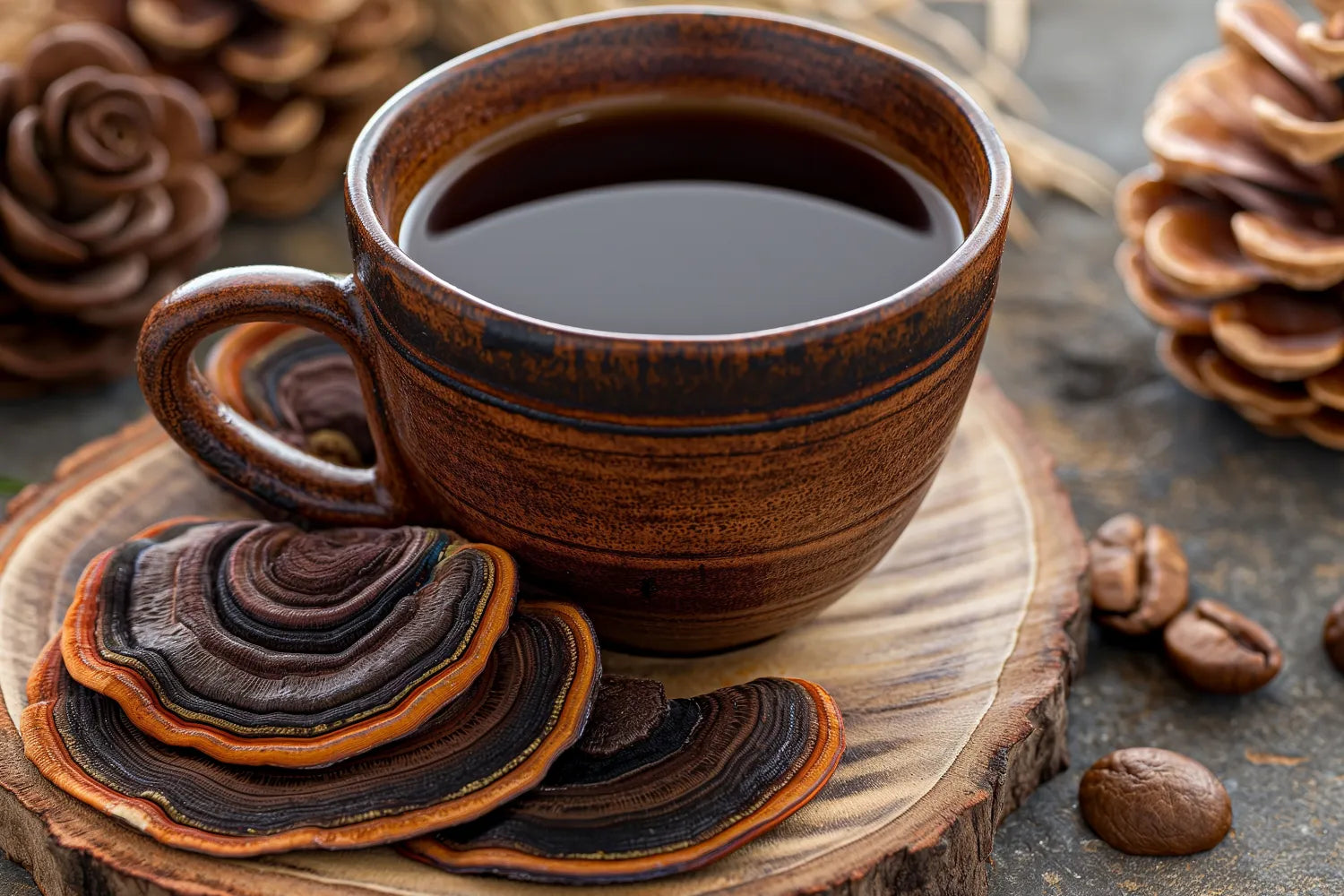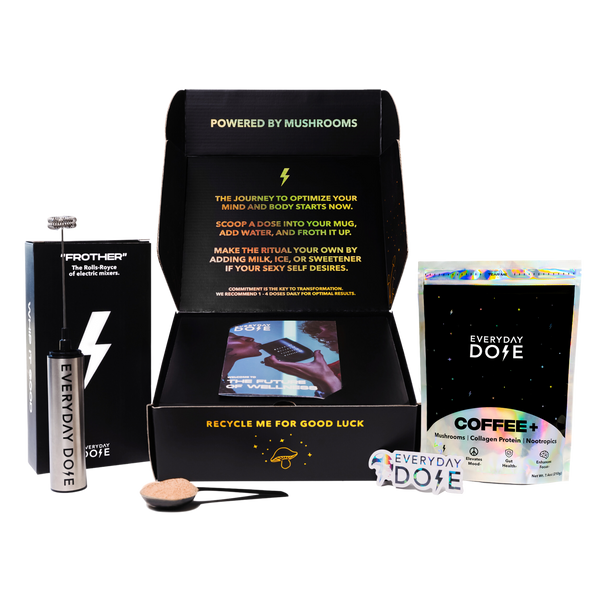Healthiest Forms of Caffeine: Why Coffee and Tea Reign Supreme

If you need some caffeine to get through the day, we don’t blame you — we all need a helping hand sometimes. However, you don’t have to flood your body with harmful toxins and substances just to get a caffeine fix. And unfortunately, many popular forms of caffeine are packed with these kinds of harmful ingredients.
So, how are you supposed to enjoy a guilt-free dose of caffeine? Read on for our list of the six healthiest forms of caffeine and what makes them worth your while.
Where Does Caffeine Come From?
First, let’s learn a little more about caffeine. Found in plants like coffee beans, tea leaves, and guarana, caffeine is a compound that can excite our nervous system, helping us feel more energetic, motivated, and focused. This helps fuel everything from the Monday morning hustle to late-night study sessions.
Not all caffeine is natural, though. Some products are made with caffeine that was made in a lab, which can be more powerful and more processed than natural sources.
Natural sources are the healthiest forms of caffeine because they skip the weird stuff you’ll find in overly processed options like energy drinks. Plus, they taste way better. Let’s be real — who doesn’t perk up at the aroma of freshly brewed coffee or tea?
6 Healthiest Forms of Caffeine
So, what are the healthiest forms of caffeine, and are they really worth drinking over your favorite energy drink? Read on and prepare to change your mind about synthetic sources of caffeine.
1. Matcha
Matcha isn’t just a trendy green drink — it’s a powerhouse of health benefits. Unlike regular green tea, matcha is made by grinding whole tea leaves into powder. When you drink matcha, you’re consuming the entire tea leaf.
This means you get more antioxidants, like polyphenols, which can support your brain, heart, immune, and digestive health. Matcha also contains l-theanine, an amino acid that can mitigate the side effects of caffeine. This can help you feel calm and focused instead of jittery.
But why settle with just matcha? Our Mushroom Matcha+ contains ceremonial grade matcha as well as lion’s mane mushroom to support focus and memory-making skills. Plus, our blend features extra L-theanine so you can experience even more of the relaxing benefits of matcha green tea.
2. Green Tea
Wait, didn’t we just talk about green tea? While matcha and green tea are made from the same plant, the tea plants are grown differently to encourage different levels of benefits.
Packed with antioxidants like catechins, regular green tea can support heart health, weight loss, and even lower blood pressure. Its lower caffeine content compared to coffee also makes it a great option for those who want a mild pick-me-up without risking jitters.
Green tea also contains l-theanine, although it doesn’t contain as much as matcha due to different growing conditions. Plus, the variety of green teas, from sencha to jasmine, means there’s a flavor profile for every tea lover.
3. Black Tea
Black tea is like green tea’s older sibling. Black tea is made from the same plant as matcha and green tea, but the leaves are processed a little differently, which gives it a different set of benefits.
With a slightly higher caffeine content, black tea is great for mornings when you need a little extra pep in your step. It’s also rich in antioxidants, which can support heart health and potentially reduce the risk of type 2 diabetes.
Black tea also has polyphenols that can improve gut health and immunity. You can sip it plain, add a splash of milk, or turn it into a chai latte for a sweet and creamy treat.
4. Coffee
Known for its strong caffeine content, coffee can help you feel an almost instant energy boost and flood of focus. But it’s not just about the caffeine — coffee is also rich in antioxidants, like chlorogenic acid, which can support heart health.
If you want even more benefits in your morning cup, try our Mushroom Coffee+. This mushroom blend features lion’s mane and chaga mushrooms to support gut health and immunity, collagen to encourage gut and skin health, and L-theanine to help keep jitters at bay.
Coffee is versatile, too — you can enjoy it as a classic drip coffee, espresso, or cold brew. To keep it healthy, go easy on the syrups and creamers, and savor the natural flavor of the coffee beans.
5. Yerba Mate
Yerba mate is the secret of energy seekers who want more than just a caffeine jolt. Popular in South American cultures, this tea is made by steeping dried leaves and twigs of the Ilex paraguariensis plant.
It has about the same caffeine content as coffee but delivers a smoother, longer-lasting energy without the crash. Because it’s all natural, yerba mate also contains antioxidants, vitamins, and minerals. Enjoy it traditionally in a gourd with a metal straw (traditionally called a bombilla) or brew it like tea for a convenient pick-me-up.
6. Chocolate
Chocolate, especially dark chocolate, is a surprisingly healthy source of caffeine. While it has a lower amount of caffeine than coffee or tea, it can help gently boost your energy without overloading your system.
Packed with antioxidants like polyphenols, dark chocolate may support heart health and improve blood flow. It’s also a source of theobromine, a compound that works alongside caffeine to enhance mood and focus. Additionally, chocolate contains minerals like magnesium and calcium, which are hugely important for your body’s energy production.
For the healthiest option, choose dark chocolate with at least 70% cocoa content. You should also enjoy it sparingly, since an entire bar has about 80 mg of caffeine.
What Forms of Caffeine Should You Avoid?
Some sources of caffeine might come in pretty packaging that makes big promises, but they’re actually full of bad ingredients. Energy drinks, for instance, are loaded with caffeine but also come with a ton of added sugar and artificial sweeteners.
Sure, they’ll keep you awake, but at what cost? Your energy levels are swinging between extremes like a rollercoaster, and your heart rate will be through the roof.
You should also avoid syrupy coffee drinks. You know the ones — they come with whipped cream, chocolate drizzle, and enough syrups to qualify as dessert. These caffeinated beverages might give you energy, but that’s more a result of the extreme amounts of sugar they contain — not the caffeine.
Even sodas are less than ideal. They are fizzy and flavorful, but they come with zero health benefits and a potential hit to your calcium levels. Finally, don’t get us started on caffeinated snacks — do you really need your gum or protein bar to be wired with caffeine?
How Much Caffeine Can You Drink a Day?
The FDA (that’s the Food and Drug Administration, for those who don’t know) says healthy adults can safely consume up to 400 milligrams of caffeine daily — this is about roughly four cups of coffee. But here’s the thing: Caffeine tolerance isn’t one-size-fits-all.
Some people thrive on a double espresso and a few cups of coffee back-to-back, while others get jittery halfway through their single cup of morning coffee. Unfortunately, you have genetics to blame.
Your body decides your ideal caffeine intake based on a set of genes you received from your parents. If two cups of coffee have you feeling like a hummingbird on a sugar high, don’t push it to hit some arbitrary “recommended limit.”
Listen to your body when it comes to coffee consumption . Signs like jitters, a racing heart, or trouble sleeping mean you might need to cut back. Switching to lighter options like herbal teas, decaf, or our low-caf mushroom coffee can help you enjoy a morning cup or two without side effects.
The Bottom Line
Caffeine, caffeine — what would we do without it? While caffeine is a natural compound that can actually come with health benefits, there are some sources of caffeine that are decidedly not natural. These sources can also come with some significant health risks because of how much caffeine they include.
The healthiest sources of caffeine include matcha, black tea, coffee, and chocolate. While these sources are healthy on their own, you can enjoy some added benefits when you try our coffee and matcha mushroom blends.
Sources:
Dark chocolate: 70% cacao solids | USDA
Health Benefits and Chemical Composition of Matcha Green Tea: A Review | PMC
Tea Consumption and Risk of Type 2 Diabetes: A Meta-Analysis of Cohort Studies | PMC
Yerba Mate—A Long but Current History | PMC
Health benefits and mechanisms of theobromine | ScienceDirect








